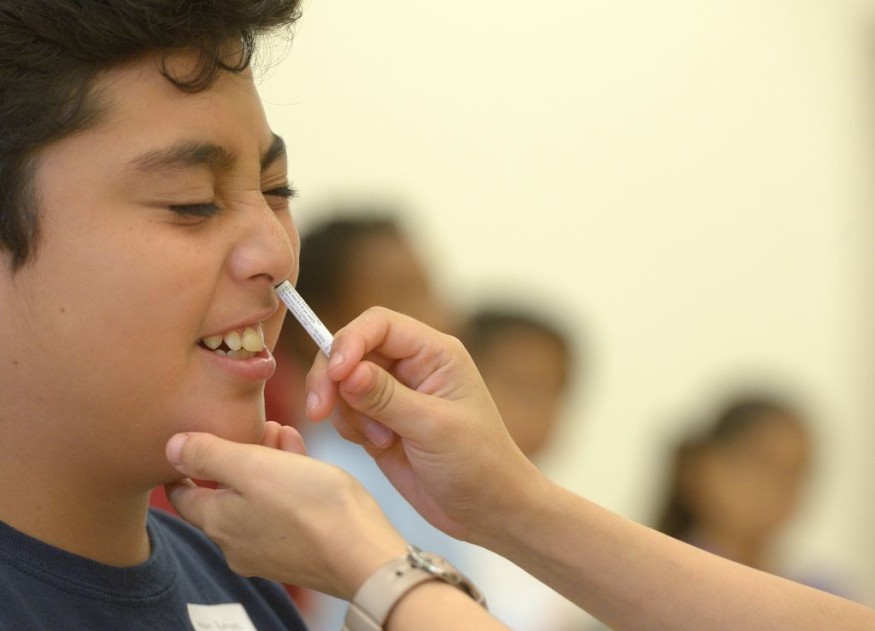New research recently demonstrated the possible efficacy of an inhalable COVID-19 vaccine, one of the many vaccines in development designed to be given through a nasal spray.
A New Atlas report said, according to researcher Paul McCray, from the University from Iowa who's working on an inhalable COVID-19 vaccine, the presently available vaccines against COVID-19 are quite successful, although the majority of the population of the world remains unvaccinated and there is a crucial need for more vaccines that are easy and effective at preventing disease and transmission.
McCray is currently working with colleagues from the University of Georgia on a single-dose COVID-19 vaccine administered through a nasal spray.
Their specific vaccine uses a virus known as "parainfluenza virus 5 or PIV5," optimized for the expression of spike protein from SARS-CoV-2.

Parainfluenza Virus 5
PIV5 is innocuous in humans, and past experiments with the virus as a vaccine delivery system have been effective in studies in animals against MERS, another type of coronavirus. The new data presents the experimental COVID-19 vaccine as effective in ferrets and mice.
According to Biao He, a co-lead on the study from the University of Georgia, they have been developing this inhalable COVID-19 vaccine during the onset of the pandemic.
The co-author added that their preclinical data present that this vaccine not just shield against infection but substantially lessens the chances of transmission.
Traditional vaccines are typically given through an intramuscular injection. However, injections are coming with an entire load of hurdles that make the widespread vaccination campaigns complicated, not to mention expensive.
Injected vaccines frequently need cold storage and need to be given by medical professionals. Syringes are a finite resource too, and supply problems have resulted in major problems with the COVID-19 vaccine rollout.
FluMist Nasal Spray Vaccine
One nasal spray, FluMist, the vaccine is currently available in the market. This vaccine targets influenza, and in spite of being authorized for roughly a decade, its efficacy has varied from year to year.
For many years, both the American Academy of Pediatrics and the Centers for Disease Control and Prevention recommended the injectable flu vaccine over this inhalable form. Although recently changed that recommendation, AAP News reported that after a new formulation exhibited improved effectiveness during the 2019-2020 flu season.
Alongside the comfort of administration of a nasal spray vaccine, there is a strong hypothesis that suggests administering vaccines directly to mucosal tissue in the upper respiratory tract could provide a better-localized shield from infection.
Bioengineer Darrel Irvine, from MIT, has been working on the development of inhalable vaccines for many years. In some circumstances, he said vaccines given in muscle can stimulate immunity at mucosal surfaces, although there is a general principle that if one vaccinates through the mucosal surface, he tends to elicit a stronger shield at that site.
Regrettably, continued Irvine, they do not have great technologies for escalating immune responses that specifically shield such mucosal surfaces.
Inhalable COVID-19 Vaccines in Early Stage Human Trials
A small number of inhalable COVID-19 vaccines are currently in early-stage human trials. Early this year, Oxford University researchers started Phase 1human trials for a nasal spray form of its AstraZeneca COVID-19 vaccine.
According to the chief investigator on trial Sandy Douglas, they are initially examining the safety profile in young, healthy volunteers of the nasal spray.
It is hoped administering the COVID-19 vaccine through upper respiratory tissue could provide a better shield against mild disease and onward transmission, although Douglas noted too that inhalable administration needs to increase vaccine uptake, too.
The chief investigator added, there are various people who will find an intranasal delivery system more attractive, which may mean vaccine uptake is higher in the said groups.
It might have practical benefits too; he continued, nasal sprays have been successfully used for other vaccines, for instance, the flu vaccine used in the United Kingdom schools.
Not Effective for All Pathogens
In general, there are roughly seven intranasal COVID-19 vaccines at present in the early stages, although it remains unclear if such a route of administration will be effective for SARS-CoV-2.
Most recently, the Altimmune pharmaceutical firm stopped its work on its inhalable vaccine candidate after Phase 1 human trials presented weak immune responses.
Mayo Clinic immune researcher Richard Kennedy said it appears increasingly clear that inhalable vaccines are ineffective for all pathogens. Several study dead-ends over the past decade specified.
That developing an inhalable COVID-19 vaccine may not be a simple task, although hopefully, with studies at a fast pace, there will have some answers in the coming years.
The new study, "Protection of K18-hACE2 mice and ferrets against SARS-CoV-2 challenge by a single-dose mucosal immunization with a parainfluenza virus 5-based COVID-19 vaccine", was published in Science Advances.
Related information about inhalable COVID-19 vaccine is shown on The Strait Times' YouTube video below:
Check out more news and information on COVID-19 and Vaccines in Science Times.
© 2026 ScienceTimes.com All rights reserved. Do not reproduce without permission. The window to the world of Science Times.












